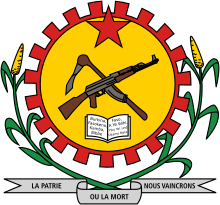Thomas Sankara
Thomas Isidore Noël Sankara (French pronunciation: [tɔmɑ izidɔʁ nɔɛl sɑ̃kaʁa]; 21 December 1949 – 15 October 1987) was a Burkinabè military officer, Marxist revolutionary and Pan-Africanist who became President of Burkina Faso from 1983, when he took over in a coup, until his assassination in 1987.
However, he welcomed some foreign aid in an effort to boost the domestic economy, diversify the sources of assistance, and make Burkina Faso self-sufficient.
[5] His domestic policies included famine prevention, agrarian expansion, land reform, and suspending rural poll taxes, as well as a nationwide literacy campaign and vaccination program to reduce meningitis, yellow fever and measles.
[16][17] His Popular Revolutionary Tribunals prosecuted public officials charged with graft, political crimes[12] and corruption, considering such elements of the state counter-revolutionaries.
[19] Sankara's revolutionary programmes and reforms for African self-reliance made him an icon to many of Africa's poverty-stricken nations,[20] and the president remained popular with a substantial majority of his country's citizens, as well as those outside Burkina Faso.
Thomas's decision to continue with his education at the nearest lycée, Ouezzin Coulibaly (named after a pre-independence nationalist), proved to be a turning point.
He invited a few of his brightest and more political students, among them Sankara, to join informal discussions outside the classroom about imperialism, neocolonialism, socialism and communism, the Soviet and Chinese revolutions, the liberation movements in Africa, and similar topics.
At the Antsirabe academy, the range of instruction went beyond standard military subjects, which allowed Sankara to study agriculture, including how to raise crop yields and better the lives of farmers.
During the presidency of Colonel Saye Zerbo, a group of young officers formed a secret organization called ROC, the best-known members being Henri Zongo, Jean-Baptiste Boukary Lingani, Blaise Compaoré and Sankara.
Sankara identified as a revolutionary and was inspired by the examples of Cuba's Fidel Castro and Che Guevara, and Ghana's military leader Jerry Rawlings.
The ideology of the Revolution was defined by Sankara as anti-imperialist in a speech on 2 October 1983, the Discours d'orientation politique (DOP),[39] written by his close associate Valère Somé.
He engaged in three major battles: against bush fires, 'which will be considered as crimes and will be punished as such'; against cattle roaming, 'which infringes on the rights of peoples because unattended animals destroy nature'; and against the chaotic cutting of firewood, 'whose profession will have to be organized and regulated'.
To face the advancing desert and recurrent droughts, Thomas Sankara also proposed planting wooded strips of about fifty kilometers, crossing the country from east to west.
His government banned female genital mutilation, forced marriages and polygamy, while appointing women to high governmental positions and encouraging them to work outside the home and stay in school even if pregnant.
[20] Following the 1974 clashes between Burkina Faso and Mali over the disputed territory of the Agacher Strip, the Organization of African Unity had created a mediation commission to resolve the disagreement and provide for an independent, neutral demarcation of the border.
With Algerian mediation, the two agreed to have the border dispute settled by the International Court of Justice (ICJ) and subsequently petitioned the body to resolve the issue.
[61] In July 1985 Burkina Faso declared the Malian secretary general of the Economic Community of West Africa, Drissa Keita, a persona non grata after he criticized Sankara's regime.
[62][63][64] Around the same time, Sankara and other key figures in the CNR became convinced that Traoré was harbouring opposition to the Burkinabé regime in Bamako and plotting to provoke a border war, which would be used to support a counterrevolution.
Mali accused the military authorities of pressuring Malian citizens in border villages to register with the census, a charge which Burkina Faso disputed.
In contrast to Michaud's assertion, a Central Intelligence Agency (CIA) cable states, 'The war was born of Bamako's hope that the conflict would trigger a coup in Burkina Faso.
[61] The ICJ later split the Agacher; Mali received the more-densely populated western portion and Burkina Faso the eastern section centred on the Béli River.
[77] At a rally held after the war, Sankara conceded that his country's military was not adequately armed and announced the commutation of sentences for numerous political prisoners.
When President François Mitterrand visited Burkina Faso in November 1986, Sankara criticized the French for having received Pieter Botha, the Prime Minister of South Africa, which still enforced apartheid; and Jonas Savimbi, the leader of UNITA, in France, referring to both men as 'covered in blood from head to toe'.
[79] Guy Penne [fr], President Mitterrand's advisor on African affairs, organized a media campaign in France to denigrate Thomas Sankara in collaboration with the DGSE.
After meeting with Fidel Castro, Sankara arranged to send young Burkinabés to Cuba in September 1986 to receive professional training and to participate in the country's development upon their return.
[80] Denouncing the support of the United States to Israel and South Africa, he called on African countries to boycott the 1984 Summer Olympics in Los Angeles.
Non-governmental organizations and unions were harassed or placed under the authority of the Committees for the Defence of the Revolution, branches of which were established in each workplace and which functioned as 'organs of political and social control'.
According to Christian Morrisson and Jean-Paul Azam of the Organisation for Economic Co-operation and Development, the 'climate of urgency and drastic action in which many punishments were carried out immediately against those who had the misfortune to be found guilty of unrevolutionary behaviour, bore some resemblance to what occurred in the worst days of the French Revolution, during the Reign of Terror.
When accounting for his overthrow, Compaoré stated that Sankara jeopardized foreign relations with former colonial power France and neighbouring Ivory Coast, and accused his former comrade of plotting to assassinate opponents.
[119] Twenty years after his assassination, Sankara was commemorated on 15 October 2007 in ceremonies that took place in Burkina Faso, Mali, Senegal, Niger, Tanzania, Burundi, France, Canada and the United States.




